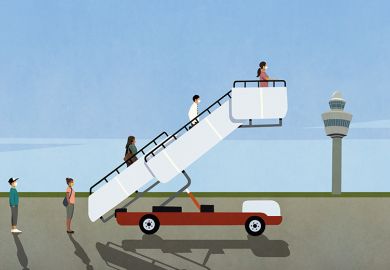Almost a third of UK university staff who participated in a survey believe that education agents push students to where they receive the highest rates of commission, according to a new report that recommends the establishment of a quality assurance framework for the activity.
A survey of 105 staff at higher education institutions found that the vast majority agreed or strongly agreed that agents were effective at counselling applicants about visa processing (88 per cent) and screening for false academic documents (70 per cent), while most also thought that agents effectively prepare students to transition to a new country and are an additional support service for students when they arrive in the UK.
However, a significant share (31 per cent) said that they agreed or strongly agreed that agents push students to the institutions where they receive the highest commission rate, according to research commissioned by the British Universities’ International Liaison Association (BUILA) and the UK Council for International Student Affairs (UKCISA).
Meanwhile, a survey of 329 international students who had used an agent found that 24 per cent thought their agent was biased towards certain universities.
However, the report says that it is “very difficult to get evidence supporting or disproving that some education agents may push students towards providers with higher commission rates”.
“In reality the details of education agent contracts are rarely known by the student counsellors, rather are subject to negotiation between the HEI and the owner. Also, a larger rate of commission does not always result in greater financial return to the education agent with most HEI commission structures tied to fees,” it adds.
The study also highlights the “aggressive marketing strategies” that are sometimes used by agents, including UK-based agents trying to recruit newly arriving students at an airport or outside campuses so they can claim a commission, or poaching a student who has already registered with another agent.
Since arriving in the UK, 29 per cent of the students surveyed said that they had been approached by other agents, mainly via digital channels, but it was not clear whether this was poaching or marketing for higher-level studies.
BUILA and UKCISA said that they were working with other partners in the sector to build and embed a formal “education agent partner quality assurance framework”, which will be launched in July. This will include a national code of ethical practice for UK education agents; a review and revamp of communication with, and training of, education agents; and the development of a good practice guide for UK providers using education agents.
The report says that these three features would “encourage greater transparency around the use of education agents, including commission practices, and could perhaps lead to HEIs receiving a kitemark for their use of reputable education agents (those signed up to the code)”.
The research was commissioned to help inform the Office for Students’ review of the admissions system in English higher education, which will address the question of whether the role of and outlay on recruitment agents is sufficiently transparent.
Register to continue
Why register?
- Registration is free and only takes a moment
- Once registered, you can read 3 articles a month
- Sign up for our newsletter
Subscribe
Or subscribe for unlimited access to:
- Unlimited access to news, views, insights & reviews
- Digital editions
- Digital access to THE’s university and college rankings analysis
Already registered or a current subscriber?








